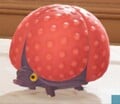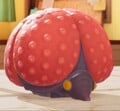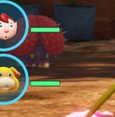Porquillion: Difference between revisions
KawaiiKiwii (talk | contribs) m (Removed future game template.) |
Ladishchap (talk | contribs) mNo edit summary |
||
| Line 10: | Line 10: | ||
}} | }} | ||
''' | The '''Porquillion''' ({{j|ハリアラシ|Hariarashi|Hedgepine}}) is a spiky [[enemy]] in {{p4}}. In some fights, Porquillions serve the role of a [[Boss|mini-boss]] and the [[music]] correspondingly changes. They attack by shooting out the spikes on their bodies, though this leaves them vulnerable until they grow them back. The spikes have a chance to stun or outright kill Pikmin. The first one encountered in the game drops the [[Interstellar Radio]]. | ||
== Stats == | == Stats == | ||
Latest revision as of 00:18, February 29, 2024
| Porquillion | |
|---|---|
| Appears in | Pikmin 4 |
| Scientific name | Castanutum pricklirus |
| Family | Sharpshell |
| Areas | Sun-Speckled Terrace, Hero's Hideaway |
| Caves | Plunder Palace, Cradle of the Beast |
| Dandori Challenge stages | Trial of the Sage Leaf |
| Dandori Battle stages | None |
| Attacks | Impale Pikmin |
The Porquillion (ハリアラシ?, lit.: "Hedgepine") is a spiky enemy in Pikmin 4. In some fights, Porquillions serve the role of a mini-boss and the music correspondingly changes. They attack by shooting out the spikes on their bodies, though this leaves them vulnerable until they grow them back. The spikes have a chance to stun or outright kill Pikmin. The first one encountered in the game drops the Interstellar Radio.
Stats[edit]
| Weight | Max. carriers |
Seeds | Value | Health |
|---|---|---|---|---|
| 12 | 24 | 20 | 5000 |
Behavior[edit]
When idling, it simply roams about the area, with its spikes at the ready. When prey gets near, but not close enough for the spikes to reach, the Porquillion faces the next quadrant of its body that it plans to attack with towards the threat, and starts shaking in anticipation. If its target ends up getting closer, it will launch all spikes in that segment of the body outward and upward, aiming them so that they land on its prey. It will keep choosing a new quadrant and attacking until the threat is gone, or until it runs out of spikes. Once out of spikes, regardless of there being targets nearby, it will pause for a moment, charge up, and secrete new spikes on all segments of the body, ready to attack again. It will not regenerate spikes in any situation unless it is completely empty.
Appearance[edit]
The creature's bulbous back is covered in a red shell filled with pores from which its white spikes come out. It is also divided into four distinct parts with a texture similar to inverted sponge. The rest of the body somewhat resembles a hedgehog's, with bulbous eyes, a tiny snout and four short legs tipped with nails.
Locations[edit]
- One appears as the first enemy encounter of the game, during the tutorial with Olimar in what is later revealed to be the Hero's Hideaway. This same Porquillion later appears in Olimar's Shipwreck Tale. The table is the same one where a Horned Cannon Beetle resides in the main game.
- In the northwest of the Sun-Speckled Terrace, next to the Distant Summit landing site.
- In the 3rd sublevel of the Plunder Palace, elevated on a platform. Such a location removes charging and rushing as a strategy against this enemy.
- On the kitchen table in the Hero's Hideaway, on top of a pile of plates to avoid being charged or rushed at. In Olimar's Shipwreck Tale, there is instead a Man-at-Legs on this table.
- In sublevel 2 of Cradle of the Beast. Here, it is not treated as a boss.
Strategy[edit]
|
The following article or section contains guides. |
The Porquillion cannot be harmed while its spikes are extended, but any quadrant of its body that it has launched the spikes from will remain vulnerable until the spikes grow back. As it is not especially fast, it can be dispatched with ease by rushing at the exposed parts. In later caves, it can be fought with Rock Pikmin, which are immune to its attacks, though this is slower than using other Pikmin who can latch on due to the Porquillion's tendancy to run away when Rock pikmin chase them during a charge or rebound.
To extend the time in which the Porquillion is vulnerable, it could be wise to use Ice Pikmin or items such as the Ice Blast or Lightning Shock to temporarily stun the beast.
During refights with the Porquillion in the Hero's Hideaway in which it is elevated on a tower that makes it impossible to rush or charge, it could be wise to instead use Winged Pikmin who can charge the Porquillion and can also be more swiftly called back. With Ultra-Spicy Spray and a small squad of Winged Pikmin (around 30 should do, but less can be used if you don't mind an extended fight) wait for the enemy to launch its first volley of spikes, then charge Winged Pikmin towards the vulnerable segment. Because of Winged Pikmin's homing ability, most of them should be able to latch onto the enemy, and if they don't they will typically be shaken off into a spot in which they are not in danger of being hit by the spikes. Simply repeatedly charge the Winged Pikmin if they fail to defeat the enemy in time, being careful to avoid the spikes. Using this method, the enemy should be swiftly defeated.
If you would prefer not to use Winged Pikmin, Purple Pikmin are the next best choice. Their high levels of impact damage mean they deal the best damage when thrown, which is what is required to beat this creature when it is elevated. Take care, however, as their slow speed makes it more difficult to call them back when in harms way.
Notes[edit]
Dalmo's Notes[edit]
Olimar's Notes[edit]
“Its needle-covered armor is soft and quite exposed.Furthermore it has a cowardly disposition, so when it senses even the slightest danger, it shoots out it spikes.
Regenerating new spikes requires significant amounts of caloric energy, so this creature requires significant amounts of food. This likely explains why, when it scrounges through garbage, it sucks up not just the insects it finds but also the trash itself.
They have ingested a few of the S.S. Dolphin's parts too, but those could never be mistaken for trash.”Louie's Notes[edit]
Naming[edit]
- See more: Sharpshell family#Naming.
- Common name: Porquillion. May be a combination of 'Porcupine', 'Quill', and 'Million'.
- Japanese nickname: ハリアラシ?. It appears to be a combination of ハリネズミ? (lit.: "hedgehog") or ハリ? (lit.: "needle") and ヤマアラシ? (lit.: "porcupine").
- Japanese name: ドドメイガグリヒコウ?, lit.: "Mulberry Chestnut Burr Cingulate". "Mulberry" may refer to its reddish color, while "chestnut burr" refers to its spikes. ヒコウ? may be short for 被甲目? (lit.: "Cingulata"), an order of animals that armadillos belong to.
- Scientific name: Castanutum pricklirus. Pricklirus is derived from "prickly", referring to the creature's sharp spikes, whereas Castanutum is derived from Castanea, the Latin word for chestnut.
- Internal names:
HARI. It directly translates into "needle", referring to how it attacks. - Prerelease: None.
Names in other languages[edit]
| Language | Name | Meaning | Notes |
|---|---|---|---|
| ハリアラシ? Hariarashi |
The name is a portmanteau of ハリネズミ? (hedgehog) and ヤマアラシ? (porcupine) | ||
(traditional) |
刺豪豬 Cì Háozhū |
Thorn Porcupine | |
(simplified) |
刺豪猪 Cì Háozhū |
Thorn Porcupine | |
| Dartelknordel | Frolicking knordel. "Knordel" may come from "knor" (oink) and "gordel(dier)" (armadillo) | ||
| Tatoursin | The name is a portmanteau of "tatou" (armadillo) and "oursin" (urchin) | ||
| Igelschwein | The name is a portmanteau of "Igel" (hedgehog) and "Stachelschwein" (porcupine) | ||
| Porcospillo | The name is a portmanteau of "porcospino" (porcupine) and "spillo" (needle) | ||
| 고슴도저 Goseumdojeo |
The name is a portmanteau of 고슴도치 (hedgehog) and 호저 (porcupine) | ||
| Tatulha | Armaneedle | The name is a portmanteau of "tatu" (armadillo) and "agulha" (needle) | |
| Porquipúas | Porcuspikes | The name is a portmanteau of "puercoespin" (porcupine) and "púas" (spikes) |



